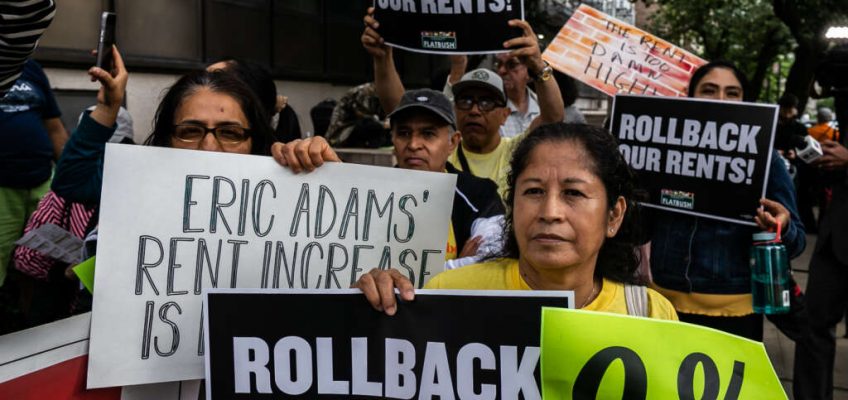The board, which votes each year on rent changes for New York City’s nearly 1 million regulated apartments, is now considering an increase between 3.75 (down from 4.75) to 7.75 percent on two-year leases starting Oct. 1. It’s still far from the rent freeze housing advocates want.
Scenes from the Rent Guidelines Board meeting vote in 2023. A final vote on this year’s changes will take place in June. (Photo by Adi Talwar)
New York City’s Rent Guidelines Board held a revote Tuesday morning, opting to consider a slightly lower range of rent hikes for stabilized apartments with two-year leases—though still far from the rent freeze housing advocates want.
The board, which votes annually on rent changes for the roughly 1 million regulated units across the city, is now considering an increase between 3.75 (down from 4.75) to 7.75 percent on two-year leases starting Oct. 1. The range proposed for one-year leases remains the same as what the board landed on with its first preliminary vote in April: an increase between 1.75 to 4.75 percent.
A final vote will be held in June.
Board Chair Doug Apple said they decided to lower the threshold under consideration for two-year leases after hearing public testimony “on the impact of potential rent increases on tenants whose incomes are not keeping pace with the rising cost of living.”
When making its determination each year, RGB considers the economic conditions both tenants and building owners are facing. Residents in rent-stabilized apartments earned a 2023 median annual income of $60,000, according to the board’s data. Meanwhile, average inflation-adjusted wages were down 0.4 percent at the end of that year and through most of 2024.
In calling for a rent freeze, tenant advocates point to RGB data which found the owners of buildings containing rent stabilized units saw a more than 12 percent increase in their Net Operating Income (NOI)—earnings left over after operating costs are paid—in 2022 and 2023.
“The Board’s own data makes clear that landlords continue to see strong returns, yet rather than providing relief to the households most in need, this vote paves the way for an increase in evictions and displacement, pushing vulnerable New Yorkers into poverty and homelessness,” the Legal Aid Society said in a statement Tuesday morning.
“These harms will only be compounded by looming cuts to federal housing programs and the likely passage of a regressive budget from Washington that will further erode the critical safety net protections the New Yorkers we serve rely on,” the organization added.
Landlord groups, however, say the NOI increases cited by the board are driven largely by properties in the core of Manhattan, pointing to buildings in several outer borough neighborhoods where owners are seeing revenues decline in the face of rising property taxes, insurance, utility and maintenance costs.
These include aging, 100-percent rent regulated buildings they argue will further deteriorate without more substantial rent increases. “Failing to address such costs will result in more vacant units and more buildings in greater financial and operational distress; a lose-lose-lose proposition for tenants, owners and the City,” James Whalen, head of the Real Estate Board of New York, testified last month.
Housing advocates, however, point to other potential interventions for those distressed properties, like greater city investment in preservation initiatives like the Neighborhood Pillars program. They say the city’s affordable housing crisis is already squeezing tenants, fueling displacement and rising homelessness.
RGB members are appointed by the mayor. The board has voted to increase rents to some degree every year under Mayor Eric Adams, who took office in 2021 and is currently running for re-election amidst a crowded field of competitors, several of whom have vowed to freeze regulated rents if elected.
“Tenants are the majority in New York City,” Cea Weaver, director of the NYS Tenant Bloc, said in a statement Tuesday. “If Adams won’t freeze the rent, we have the power to elect a mayor who will.”
The reach the editor, contact Jeanmarie@citylimits.org
Want to republish this story? Find City Limits’ reprint policy here.
The post After Revote, Rent Guidelines Board Considers Lower Range of Rent Hikes on 2-Year Leases appeared first on City Limits.


Leave a Reply